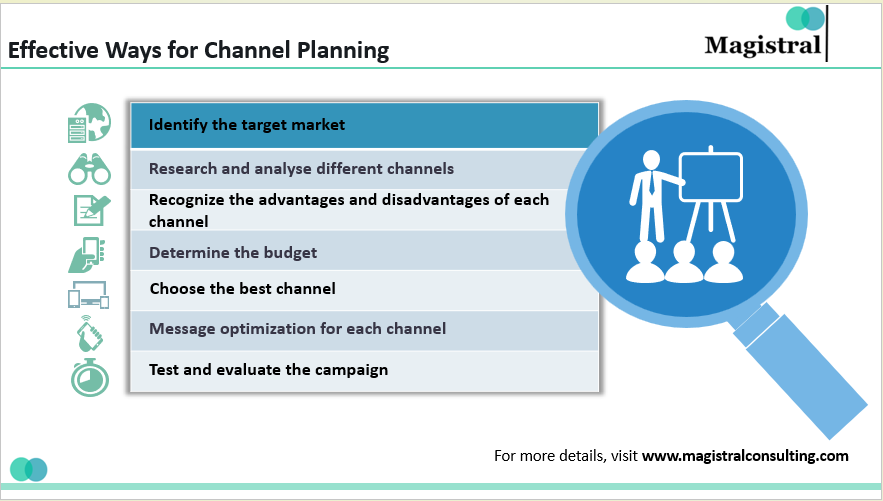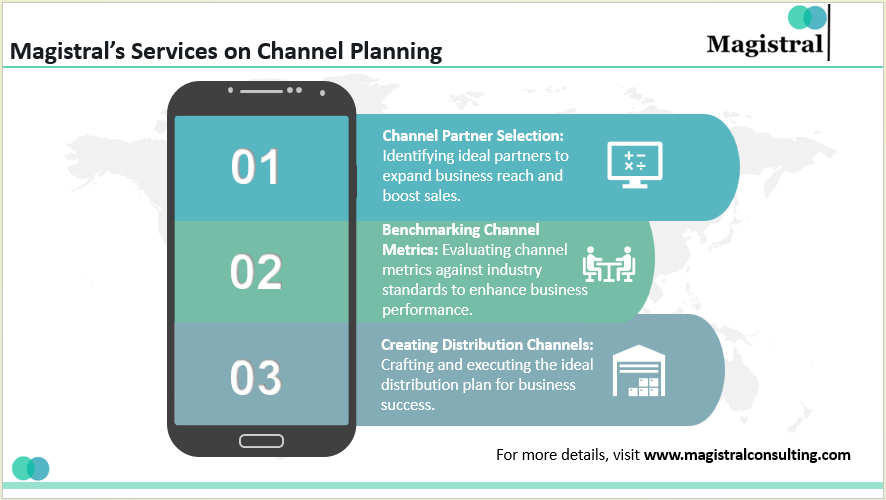Introduction
Businesses continually seek innovative methods to connect with their target audience and boost sales within the highly competitive contemporary business landscape. An essential element in attaining this goal is effective channel planning, which involves the strategic selection of communication channels for engaging with the target market. These channels can encompass various mediums, including social media, email marketing, and traditional advertising.
The efficiency of a company’s channel planning determines the effectiveness of its marketing strategy. When done correctly, it ensures that the company’s message is delivered to the right audience, in the right way, at the right time. A well-planned channel strategy can improve brand awareness, increase client loyalty, and ultimately increase sales.
However, there isn’t a channel planning strategy that works for everyone. Businesses’ target markets, budgetary limitations, and goals will differ. Understanding the various channels that are accessible and choosing the best ones for your particular business is therefore essential.
How companies approach channel planning has significantly changed in recent years. Thanks to the growth of social media and digital marketing, businesses now have more ways to reach their intended audience. As a consequence, networks like social media advertising, email marketing, and influencer marketing have gained more recognition.
Reaching the proper audience with the right message is crucial to these channels’ effectiveness. If the material is appropriate for the platform and the intended audience, social media, for instance, may be a very effective tool for businesses to interact with their audience.
In addition to choosing the right channels, companies must also consider the frequency and timing of their messaging. Too much communication can be overwhelming and turn off potential customers, while too little can lead to a lack of brand awareness.
Challenges with Channel Planning
Channel planning and effectiveness are critical components of any successful marketing campaign, but they are also areas that present several challenges. Some of these challenges are:
Evolution in marketing:
One of the biggest challenges with channel planning is the rapidly evolving nature of marketing channels, with new digital and social media platforms emerging constantly, which can make it difficult to determine which channels are most appropriate for a particular campaign and allocate resources effectively.
Changes in Customer Behavior:
One of the obstacles is keeping up with the perpetually shifting behavior of customers. This calls for a thorough understanding of customer preferences as well as a willingness to try out new channels and strategies.
Ad Fraud:
Ad fraud is an insidious adversary, sapping the vitality of marketing channels. This nefarious practice entails the surreptitious inflation of ad impressions or clicks, squandering precious ad resources and eroding the very foundations of return on investment.
Assessing Marketing Impact:
Evaluating the outcomes of marketing endeavors across diverse media platforms can pose significant challenges. This intricacy may obscure the identification of the most critical channels for a particular campaign, potentially resulting in inefficient resource allocation and suboptimal campaign optimization.
Sustaining Uniform Brand Messaging:
Another challenge lies in ensuring the uniformity of the brand message across all platforms. Maintaining brand consistency and aligning it with overarching marketing objectives across various channels necessitates meticulous planning and coordination.
Precise Targeting:
Other obstacles include maintaining current with emerging trends and technology, accurately identifying and targeting the appropriate audience across a variety of channels, and balancing short- and long-term strategies.
Effective Ways for Channel Planning
The process of choosing the most efficient routes to deliver the desired message to a specific audience is known as channel planning. In addition to more recent digital channels like social media, email, mobile apps, and search engines, the channels can also include conventional media like television, radio, print, and outdoor advertising. Understanding the target audience, choosing the most appropriate channels, and honing the message’s impact are all necessary components of effective channel planning.
Listed below are a few efficient methods for channel planning:

Effective Ways for Channel Planning
Identify your target market:
It’s crucial to identify your target audience before determining which channels to use. They, who? What traits do they possess? What do they like to do and how do they act? Understanding your target audience will help you more accurately pinpoint the platforms on which they are most likely to interact with your message.
Research and analyze different channels:
Once you have determined your intended audience, it is crucial to investigate and evaluate the various available channels. While more recent digital channels like social media, email, and mobile apps may be more effective at reaching younger, tech-savvy audiences, traditional media like television, radio, and print might prove valuable in engaging specific target groups.
Recognize the advantages and disadvantages of each channel:
Planning your strategy requires an understanding of the advantages and disadvantages that each channel offers. Television, for instance, can reach a huge audience but might be pricey and may not be as good at targeting particular demographics. Alternatively, social media can be more cost-effective and focused, but it cannot reach as many people as television.
Determine your budget:
Budgeting is necessary for channel planning, so deciding how much you’re prepared to pay is crucial before deciding which channels to use. Prioritizing the channels that are most efficient for reaching your target audience while staying within your budget is crucial because certain channels may be more expensive than others.
Choose the best channels:
Based on your investigation and analysis, pick the channels that will help you connect with your target market. Depending on your audience and budget, this can involve a mix of traditional and digital means.
Message optimization for each channel:
After choosing your channels, it’s critical to tailor your message to each one. A message that’s effective on television might not be equally successful on social media, for instance. To maximize the impact of your message, adjust it for each channel’s advantages and disadvantages.
Test and evaluate your campaign:
In order to ascertain the efficiency of your campaign, it is crucial to test and evaluate it. Tracking KPIs like engagement, conversion rates, and ROI entails modifying your strategy as necessary. This enables you to enhance the efficiency of your campaigns and gradually improve your channel planning strategy. By following these steps, you can develop a successful channel planning strategy that maximizes the impact of your message and reaches your target audience effectively.
Magistral’s Services on Channel Planning
We provide the following services for Channel planning & effectiveness:

Magistral’s Services on Channel Planning
Channel Partner Selection:
This service entails locating and choosing appropriate channel partners for a company’s goods or services. It entails doing a thorough investigation of possible partners, weighing their advantages and disadvantages, and selecting the ones who would be most beneficial to the company. Businesses can increase their reach and boost sales by forming alliances with dependable and efficient channels with the aid of this method.
Benchmarking Channel Metrics:
This service examines and contrasts a company’s channel metrics performance with best practices and industry norms. The service finds key performance indicators (KPIs) including sales volume, client acquisition cost, and customer happiness that gauge how well a business is using its channel strategy. Businesses may determine where they are succeeding and where they need to make improvements in order to reach their objectives by benchmarking their channel analytics.
Creating Distribution Channels:
This service involves creating and implementing the optimal distribution plan for a company’s goods or services. It comprises a detailed examination of the target market, the rivalry, and the range of potential distribution channels. The service assists companies in identifying the best channels to use in order to reach their target audience and meet their sales targets. It also entails planning and putting in place the infrastructure and procedures required to support the selected distribution channels, including customer service, logistics, and inventory management.
About Magistral Consulting
Magistral Consulting has helped multiple companies to reduce operations costs through its offerings in Procurement and Supply Chain.
For setting up an appointment with a Magistral representative visit www.magistralconsulting.com/contact
About the Author
The article is authored by the Marketing Department of Magistral Consulting. For any business inquiries, you can reach out to prabhash.choudhary@magistralconsulting.com